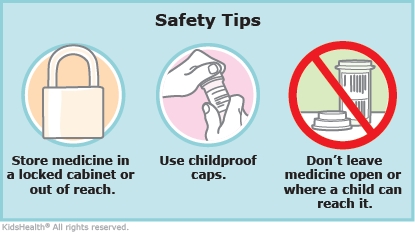Use these safety tips to help prevent poisonings in your home.


Talk to your child about poisoning risks. Teach kids to never put anything but food in their mouths without permission from an adult. Remind kids not to eat plants that they find inside or outside.
Keep hazardous items away from kids:
Store medicines safely. Keep all medicines (even those you can buy without a prescription) in a locked cabinet, out of the reach of children. Store medicines where kids can't get to them. Get rid of medicines that you don't need anymore.
Take special care when giving your child medicine. Make sure you give the right amount of medicine for your child's weight and age. Always talk to your health care provider first before giving your child any medicines, especially cough and cold medicines. Don't give your child medicines that are prescribed for someone else, or medicine that is meant for adults. Check with your health care provider or pharmacist before giving your child two different types of medicine together.
Be aware of lead paint. To avoid lead paint, use cribs, bassinets, highchairs, painted toys, or painted toy chests made after 1978. If you have an older home, have the paint tested for lead. For more information, call the National Lead Information Center at 800-424-LEAD (5323). Keep up on toys and products recalled for using lead paint. You can go to the Consumer Product Safety Commission website at https://www.recalls.gov for information.
Use carbon monoxide alarms. Carbon monoxide is a gas that has no smell, taste, or color. It comes from burning fuels (for example, wood, charcoal, or propane). Inhaling too much can be deadly. The best place for the alarms is near the furnace and bedrooms.

You have any questions about how to prevent poisoning.

Your child might have taken a poison and is not acting normally, passes out, has a seizure, or has trouble breathing. Call 911 or go to the emergency room right away. Take the item you believe poisoned your child to the ER.

What should I do if I think my child has been poisoned? If your child might have taken a poison and is alert, acting normally, and can breathe well, call Poison Control right away for advice (800-222-1222). Keep the number posted in your home (for example, on the refrigerator) and put it in your phone contacts.
If your child is not acting normally, call 911 or go to the emergency room.
Can I use pest-control products in my home? If you need to use a pest-control product inside your home, follow the manufacturer's recommendations on how to do so safely. Never put pest-control products like roach powders or rat poison on the floors of your home where young children may touch or eat them. Don't use any sprays while children are nearby.
How can I get rid of medicines we no longer need? To get rid of medicines you no longer need, talk to your health care provider or visit these online resources from the U.S. Food and Drug Administration (FDA):